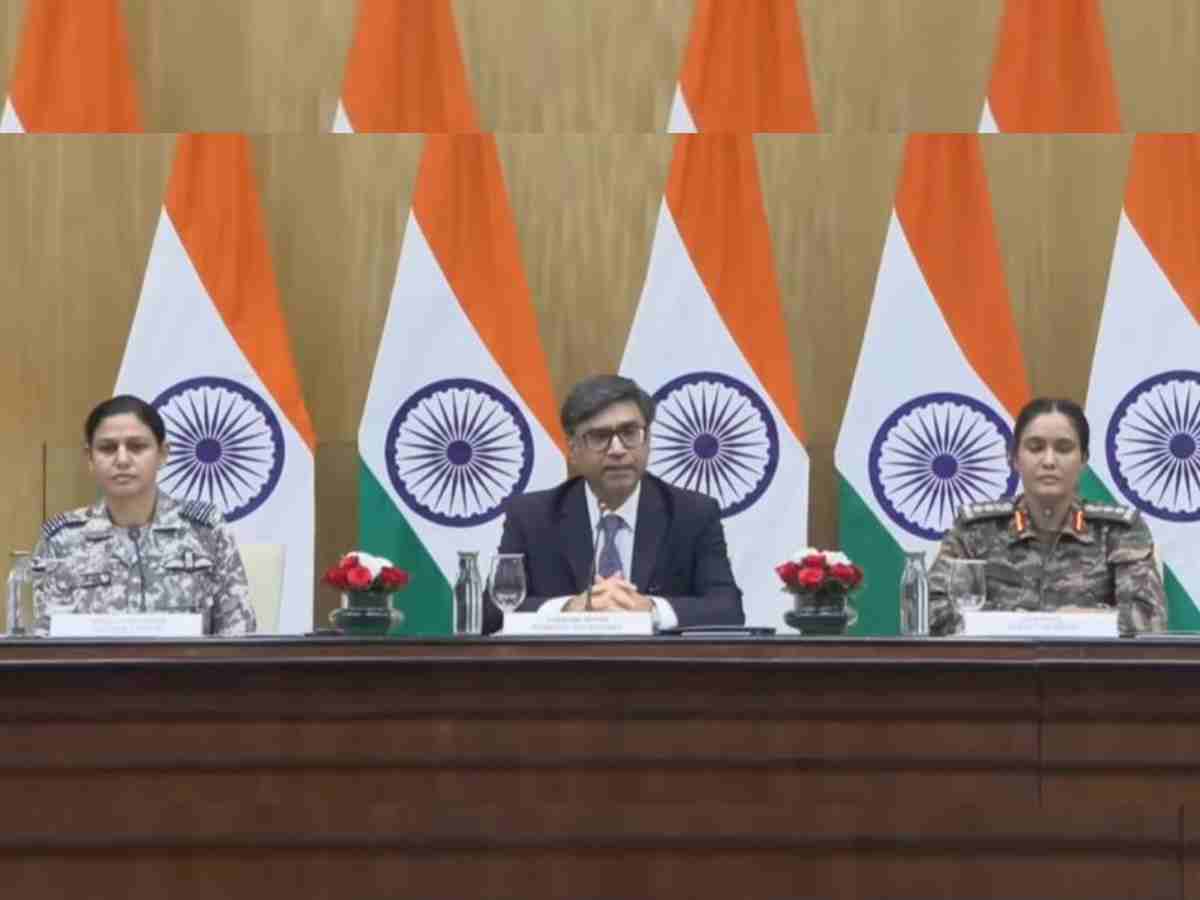Countering the disinformation by Pakistan in wake of the recent tensions, India on Thursday said that the Pahalgam terror attack on April 22 was the original escalation. In the second briefing on the issue, Foreign Secretary Vikram Misri said that the Indian response was non-escalatory, precise, and measured.
“We are only responding to the original escalation,” he said.
India has carried out a series of precision strikes on terror infrastructure in Pakistan and Pakistan-occupied Jammu and Kashmir (PoK). The strikes were launched in the early hours of Wednesday as part of ‘Operation Sindoor’.
Misri underscored that India’s response has been “controlled, precise, measured, considered and non-escalatory”. He reiterated that India’s actions were aimed at neutralising terrorist infrastructure and not military targets.
“Pakistan escalated on April 22. We are only responding to the escalation. Our intention is not to escalate matters further. However, if there is further escalation, the response will be in the appropriate domain,” Misri stated.
Misri also reiterated India’s stand that the Pakistan-backed The Resistance Force (TRF) is responsible for the Pahalgam attack. The Foreign Secretary also slammed Pakistan’s attempt to wash its hands of the matter, saying that there are no terrorists in Pakistan. Countering Pakistan, he said that its reputation as an epicentre of global terrorism has several pieces of evidence.
He further pointed to Pakistan’s global reputation as a hub for terrorism, citing its history of harbouring proscribed terrorists. “I don’t need to remind where Osama Bin Laden was found and who called him a martyr,” Misri said. “Pakistan is home to several UN-proscribed terrorists and those proscribed by many countries,” Misri added.
He criticised the Pakistani leadership for admitting ties to terror groups in recent interviews. “Their defence minister and former foreign minister have publicly accepted their country’s involvement with such terror groups,” he said, referencing comments made by Deputy Prime Minister Ishaq Dar, Defence Minister Khawaja Asif, and former Foreign Minister Bilawal Bhutto Zardari.
The senior bureaucrat also recalled Pakistan’s failure to carry out probes earlier in the 2008 Mumbai and 2016 Pathankot attacks.
He showed pictures of the funeral of terrorists from Pakistan after Operation Sindoor. Debunking Pakistan’s claims that India killed its civilians in Operation Sindoor, Misri emphasised that the picture of the funeral shows that it’s not a funeral of civilians, as many individuals in Pakistan Army uniforms can be seen and the coffins were draped in Pakistani flags. “Maybe giving terrorists state funerals is a practice in Pakistan,” Misri said.
He further asked, “It’s odd that funerals of civilians are being held with coffins draped in national flags and with state honours. What message does that send to the world?”
Misri also trashed Pakistan’s claim that India targeted religious sites in its airstrikes and said, “Targets were terrorist infrastructure and facilities. Pakistan was misusing religious sites to radicalise, indoctrinate and direct terrorists.”
He pointed out that instead, Pakistan is the one targeting religious sites and gave the example of a gurdwara which was attacked in Jammu and Kashmir on Wednesday evening, killing and injuring several members of the Sikh community. “Yesterday, Pakistan launched a targeted attack on the Sikh community in Poonch, hitting a gurdwara and killing three people. A total of 16 civilians, including women and children, have been killed in Poonch due to Pakistani shelling,” he said.
Also Read: Stuck in limbo: The plight of Pakistani Hindu migrants in Delhi
The Foreign Secretary also drew attention to Pakistan Army chief General Asim Munir’s April 16 speech, which had a communal flavour, and the Pahalgam attack, where religious profiling of victims was done, and said, “Perhaps there is a linkage between the two events, but nefarious designs will not be allowed to succeed in India.”
Speaking on the Indus Water Treaty (IWT), Misri asserted that while India has respected it for decades, Pakistan has always blocked and challenged India’s legitimate rights and did not respond to our requests for a renegotiation of the treaty. “IWT was concluded in the spirit of goodwill and friendship,” he said, suggesting that the treaty has been kept in abeyance since that spirit no longer exists.
Pakistan’s Retaliatory Attempts Foiled
In a significant development, the Ministry of Defence revealed that on the night of May 7–8, Pakistan attempted a large-scale strike on Indian military installations using drones and missiles. The attempted targets spanned Northern and Western India, including locations such as Srinagar, Jammu, Amritsar, Chandigarh, Bhatinda, Bhuj, and more.
However, all attempted strikes were successfully neutralised by India’s Integrated Counter-UAS (Unmanned Aircraft System) Grid and Air Defence systems. The senior bureaucrat said that debris from the Pakistani drones and missiles was being recovered from various sites, providing material proof of the attempted assault.
In response on Thursday, the Indian Armed Forces targeted Pakistani air defence radars and systems at multiple location, including the neutralisation of an Air Defence system in Lahore.
Colonel Sofiya Qureshi, speaking at the press briefing alongside Misri and Wing Commander Vyomika Singh, confirmed that India’s actions matched Pakistan’s in domain and intensity. “Our actions remain within the same domain—non-escalatory and focused on countering terrorist threats,” she said.
She reaffirmed that ‘Operation Sindoor’ had avoided Pakistani military establishments and focused exclusively on terror infrastructure. “India has demonstrated considerable restraint in the selection of targets and method of execution,” she added.
Wing Commander Vyomika Singh reinforced this position, stating, “India’s response was focused, measured, and non-escalatory, with no Pakistani military establishments targeted. It was reiterated that any attack on Indian military targets would invite a suitable response.”
Singh revealed that on the night of May 7–8, Pakistan attempted a large-scale strike on Indian military targets using drones and missiles. Targets included key installations in Awantipura, Srinagar, Jammu, Pathankot, Amritsar, Kapurthala, Jalandhar, Ludhiana, Adampur, Bathinda, Chandigarh, Nal, Phalodi, Uttarlai, and Bhuj.
“All incoming threats were successfully neutralised by India’s Integrated Counter-UAS Grid and Air Defence systems. Debris is being recovered from multiple locations, confirming the Pakistani attacks,” she said.
In response, the Indian Armed Forces on Thursday morning targeted multiple Pakistani air defence radars and systems, including a confirmed strike on a facility in Lahore.
Considering the escalating situation, the Union Government convened an all-party meeting on Thursday at the Parliament Annexe to brief leaders on ‘Operation Sindoor’ and the national security posture.
Defence Minister Rajnath Singh led the briefing, attended by Union Home Minister Amit Shah, BJP President JP Nadda, Congress President Mallikarjun Kharge, and Lok Sabha Leader of Opposition Rahul Gandhi, among others.
The government reiterated that India’s actions were driven by national security imperatives and the need to neutralise terror threats originating from across the border.
The Ministry of Defence stressed that while India had not targeted Pakistani military assets, any future attacks on Indian military targets would invite a “suitable response”.
Meanwhile, shelling from across the Line of Control (LoC) continues to cause casualties in Jammu and Kashmir. Pakistan has reportedly intensified unprovoked firing using mortars and heavy artillery in Kupwara, Baramulla, Uri, Poonch, Mendhar, and Rajouri sectors. Sixteen civilians, including three women and five children, have died in these attacks.
India has responded with counter-artillery measures to silence Pakistani guns and restore calm.
As tensions remain high, Indian officials continue to assert that the country is acting with maturity and restraint, focusing on neutralising the threat of terrorism rather than fuelling broader military escalation.





